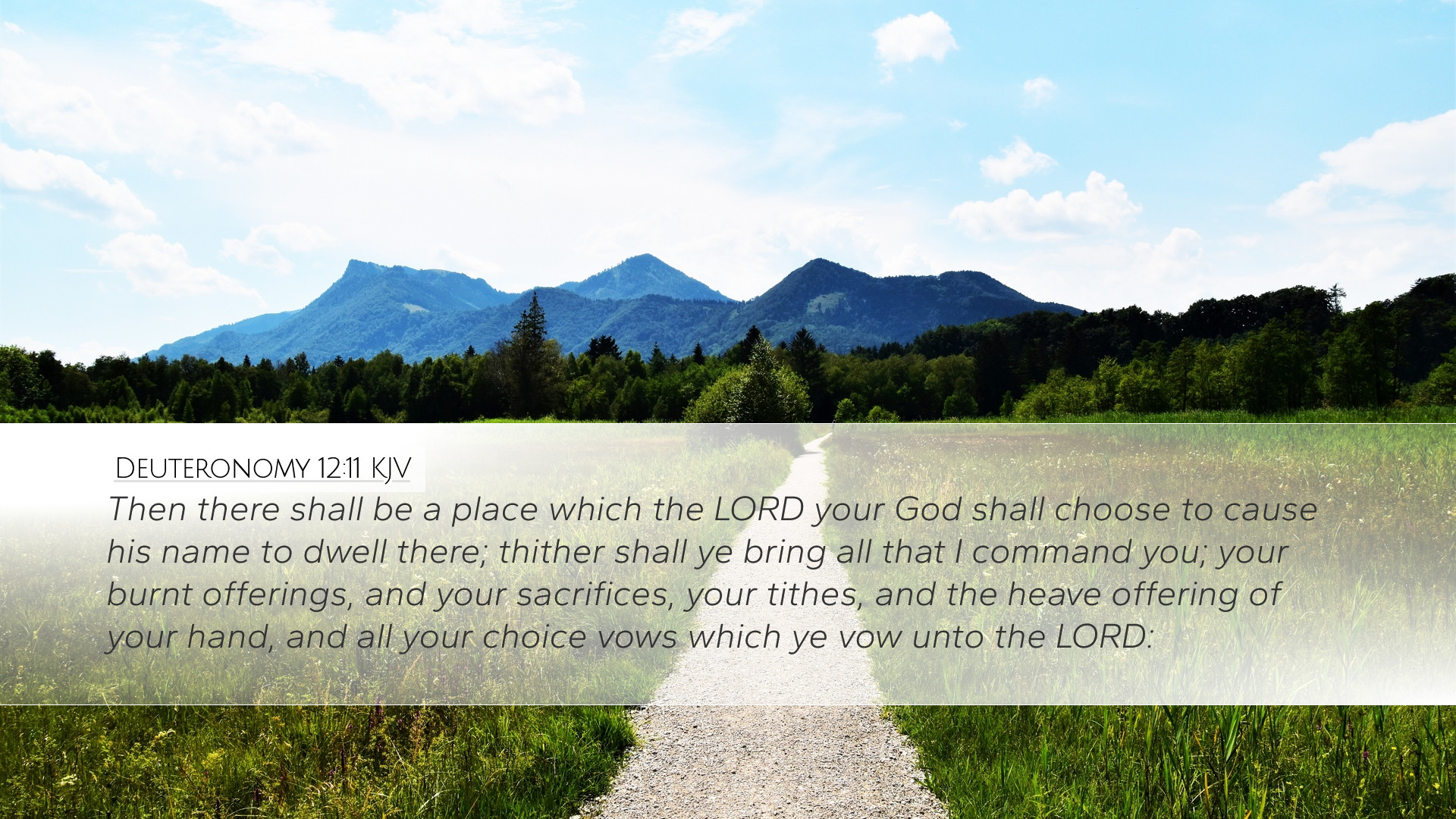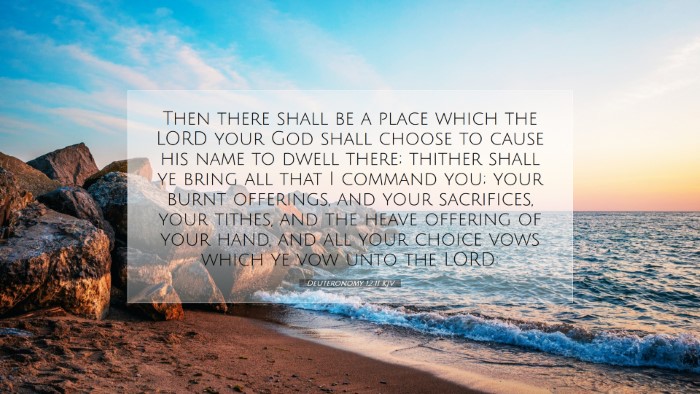Deuteronomy 12:11 Commentary
Deuteronomy 12:11 states: "Then there shall be a place which the LORD your God will choose to make His name abide there; there you shall bring all that I command you: your burnt offerings and your sacrifices, your tithes and the heave offerings of your hand, and all your choice offerings which you vow to the LORD."
Introduction
This verse stands as a pivotal instruction within the broader framework of the Mosaic law given to the Israelites. It emphasizes the selection of a central place of worship and denotes the significance of divine choice, sacred offerings, and covenant fidelity. The commentary below seeks to bring forth insights from notable public domain resources such as Matthew Henry, Albert Barnes, and Adam Clarke, aiming to illuminate this profound passage for pastors, students, theologians, and Bible scholars.
God's Chosen Place
Matthew Henry elucidates the importance of a specific location chosen by God: “A place which the LORD your God will choose.” This selection underscores God’s sovereignty and intentionality in establishing a location for worship. It signifies the transition from a mobile worship system centered around the Tabernacle to a fixed place, denoting stability and permanence in worship.
Albert Barnes adds that this chosen place would later manifest as Jerusalem, where the Temple would be built. It becomes a symbol of God’s presence among His people. The act of bringing offerings to this designated site emphasizes the communal and corporate aspect of worship, uniting the people in their service to God.
The Nature of Offerings
In detailing the types of offerings to be brought, the verse lists burnt offerings, sacrifices, tithes, and heave offerings. Adam Clarke interprets each category as having distinct purposes emphasizing spirituality and genuine devotion. Burnt offerings signify complete dedication to God, while sacrifices often express gratitude or atonement.
Matthew Henry notes that the inclusion of tithes reflects God’s claim over a portion of the people’s resources, symbolizing a recognition of His provision. Furthermore, the heave offering illustrates the act of lifting one's contribution before God, an expression of reverence and acknowledgment of His sovereignty over their lives.
Covenant Relationship
The act of bringing offerings to the designated place also reinforces the concept of covenant relationship. Albert Barnes stresses this relationship in terms of obedience: “there you shall bring all that I command you.” Worship must be rooted in obedience, as it's not merely ritualistic but stems from a heart aligned with God’s will.
Adam Clarke emphasizes the necessity of fulfilling vows made to the Lord, indicating that genuine worship involves accountability and commitment. The offerings, therefore, signify not only personal devotion but collective fidelity to God’s covenant, reflecting both individual and communal responsibilities.
Theological Implications
This passage invites deeper theological reflection. Matthew Henry alludes to Jesus Christ as the ultimate fulfillment of these offerings. On a profound level, believers are reminded that Christ’s sacrifice is the consummate offering, transcending the Old Covenant, yet rooting back to the principles outlined in the law. The chosen place becomes a precursor to the spiritual worship commanded in the New Testament, where the believer’s body is viewed as the temple of the Holy Spirit.
Albert Barnes leads us to consider how this theological framework encourages modern believers to recognize the importance of setting aside time and space for worship, and intentionally bringing their offerings to God. It calls for spiritual engagement that is embedded within community life, reflecting a collective approach to honoring God.
Practical Applications
There are several practical applications emerging from Deuteronomy 12:11:
- Place of Worship: Encourage congregations to appreciate and respect the places designated for worship, recognizing them as valuable spaces of meeting with God.
- Corporate Worship: Foster an understanding of the significance of community in worship—reminding believers that they are part of a larger body.
- Heart of Giving: Teach about the different forms of offerings and the heart behind giving—encouraging generosity that reflects devotion.
- Obedience and Commitment: Highlight the connection between worship and obedience, urging members to fulfill their commitments and vows to God.
- Spiritual Sacrifice: Draw parallels to the New Testament, encouraging believers to offer personal lives as living sacrifices in worship.
Conclusion
Deuteronomy 12:11 serves as a profound reminder of the importance of worship in the life of God’s people. The designated place of worship foreshadows the relational dynamics of serving a God who desires a covenant relationship. The offerings signify an obedient heart responding to divine grace. As pastors, theologians, and students of Scripture, this verse calls us to engage deeply with both its historical context and its ongoing relevance in the life of the church today.


